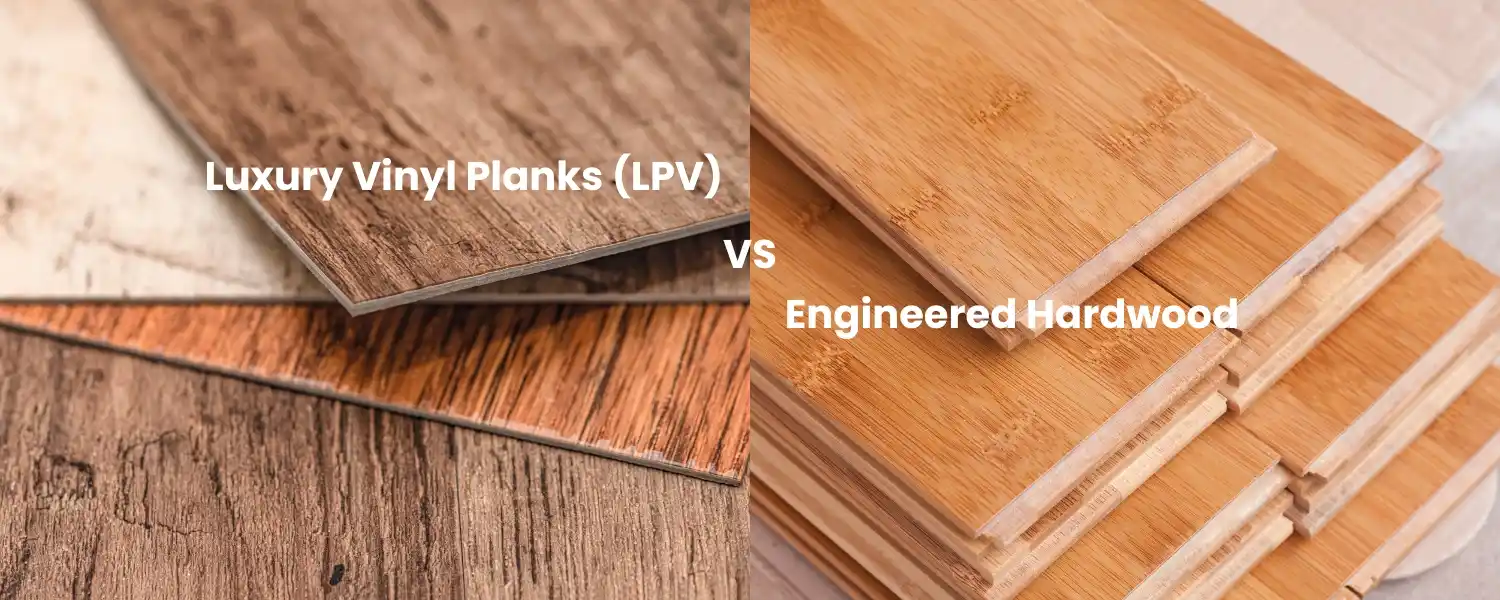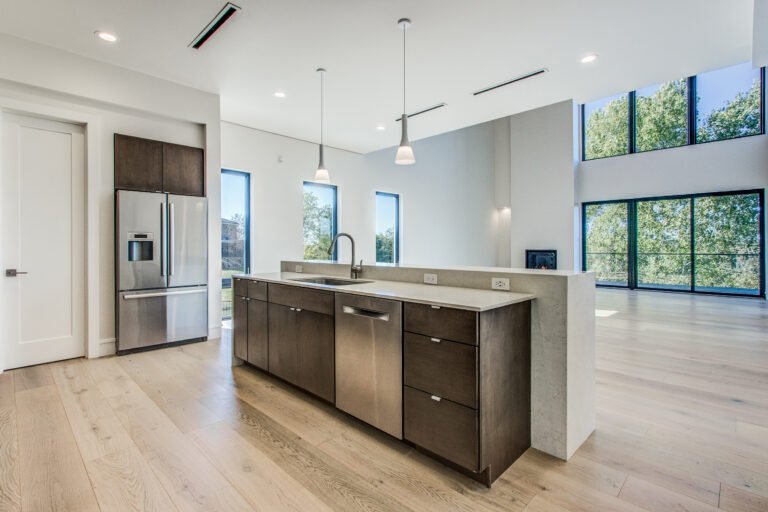Which is Better: LVP vs Engineered Hardwood
Choosing between lvp vs engineered hardwood can be daunting for homeowners browsing flooring manufacturer websites or strolling through interior design showrooms. It’s more than just selecting custom flooring; it’s about channeling your inner architect and interior designer to define your home’s architectural soul, character, mood and style. Let us guide you through the differences between the two popular residential flooring options so you can confidently make the perfect choice that suits your preferences, budget and style. Whether renovating or starting from scratch, understanding the difference between LVP and engineered hardwood is the first step in upgrading kitchen, living room or other home interior space.
Understanding Engineered Hardwood Flooring
What is Engineered Hardwood Flooring?
Engineered hardwood flooring is a flexible and widely favored substitute for traditional hardwood among architects, designers and home decor retailers for traditional hardwood. It consists of several layers of wood veneer that bond together using adhesives and heat. The uppermost layer, known as the wear layer, comprises premium hardwood. The inner layers usually consist of plywood, High-Density Fiberboard (HDF) or other water-resistant materials.
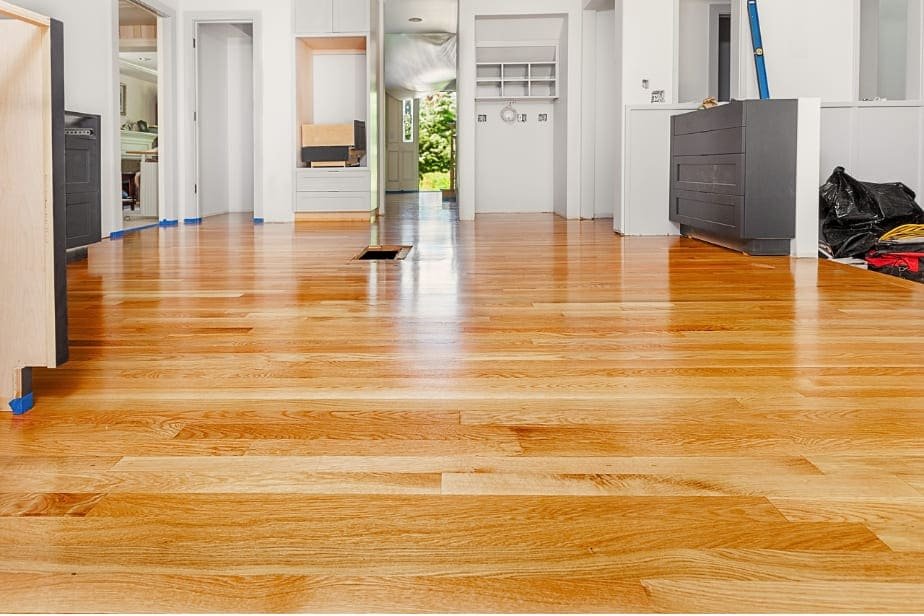
Advantages of Engineered Hardwood Flooring
The benefits of installing engineered hardwood flooring include:
- Durability: Engineered hardwood flooring is highly durable, scratch-resistant and withstands the negative effects of moisture and temperature changes. Its multi-layered construction provides stability, reducing the risk of warping and shrinking.
- Versatility: We can install engineered hardwood flooring in various environments, including basements and areas with radiant heating systems.
- Budget-Friendly: Engineered flooring offers the traditional natural beauty of hardwood at a more affordable price, making it a cost-effective choice for homeowners.
- Easy Installation: Engineered hardwood flooring often features click-lock or tongue-and-groove systems, simplifying installation.
- Wide Style Selection: With numerous wood species, finishes, and textures, as well as contemporary patterns like chevron or herringbone, engineered hardwood flooring can complement any interior style.
- Environmental Benefits: Engineered hardwood flooring uses fewer hardwood resources in its construction. It often includes sustainable materials in its core layers. This inclusion can make it a more eco-friendly option.
Learn more about engineered hardwood flooring in our comprehensive blog, “What is Engineered Hardwood Flooring?“
Exploring LVP
What is LVP?
LVP, or Luxury Vinyl Plank, is a trending modern flooring choice that imitates the look and feel of natural hardwood, tile or stone. It comprises several layers, including a vinyl core, a printed design layer and a scratch-resistant laminate protective wear layer, all interconnected through advanced manufacturing techniques.
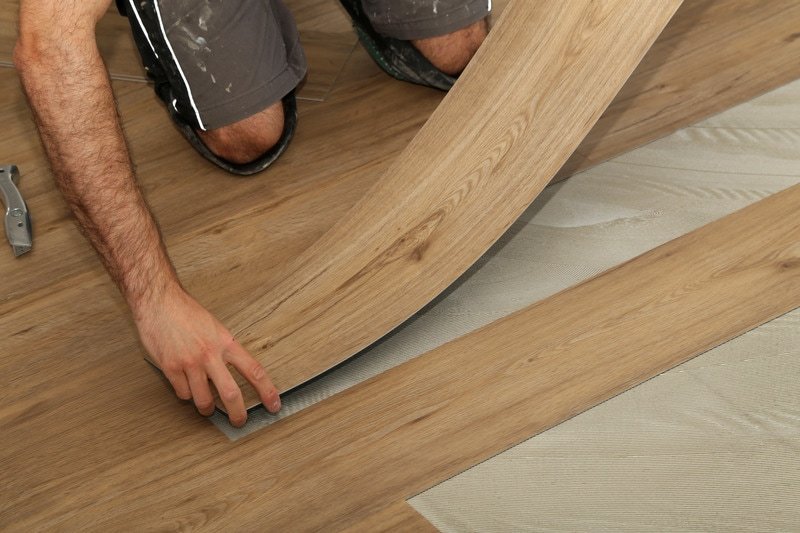
Advantages of LVP
The advantages of LVP are:
- Durability: LVP is extremely durable and can withstand scratches, dents, stains and moisture. It’s perfect for high-traffic areas, commercial spaces kid-friendly and pet-friendly floor spaces within the house.
- Water Resistance: LVP is waterproof, making it suitable for kitchens, bathrooms, laundry rooms and other moisture-prone areas.
- Easy Maintenance: LVP requires minimal upkeep. You can easily clean it with a damp mop or mild cleanser. Its protective wear layer prevents scratches and stains, ensuring long-lasting beauty with minimal effort.
- Versatility: LVP offers various styles, colors and textures, allowing homeowners to achieve the desired aesthetic. Whether you prefer rustic hardwood, sleek tile or natural stone, there’s an LVP option for every taste and decor style.
- Comfortable Underfoot: LVP provides a soft, flexible surface, offering a comfortable walking experience. Some LVP products even have built-in underlayment for added cushioning and noise reduction.
- Easy Installation: Many LVP products feature click-lock or adhesive installation systems, making them suitable for DIYers and professional installers. The floating installation method allows for quick and hassle-free replacement of individual planks.
LVP vs Engineered Hardwood
| Aspect | LVP | Engineered Hardwood |
| Durability | Highly durable, resistant to scratches, dents and stains | Durable but more prone to scratches and dents |
| Installation | Easy click-lock or adhesive installation | Can be glued, nailed or floated over various subfloors |
| Maintenance | Minimal maintenance required | Easy to clean and maintain |
| Cost Analysis | Generally more affordable | Higher upfront cost, but cost-effective in the long run |
| Lifespan | Shorter lifespan of 10 to 20 years | Longer lifespan of 20 to 30 years |
Head-to-Head Comparison
Durability
Engineered Hardwood Flooring
Renowned for its exceptional durability, engineered hardwood’s multi-layered construction makes it resistant to scratches, dents and wear. It’s also less likely to warp, making it perfect for areas with fluctuating humidity levels.
LVP
LVP is similarly durable and includes a protective wear layer that shields against scratches, stains and water damage. It’s well-suited for high-traffic areas. However, it may exhibit signs of wear over time, especially in spaces with heavy furniture or sharp objects.
Which is the best? LVP vs Engineered Hardwood
Although both options are durable, engineered hardwood surpasses in terms of durability. Its genuine hardwood top layer and sturdy construction offer greater longevity and strength, making it the preferred choice for lasting durability.
Lifespan
Engineered Hardwood Flooring
Engineered hardwood can last 20 to 30 years with proper care and maintenance. It also has the added advantage of being able to be sanded and refinished to restore its appearance.
To learn more about the lifespan of engineered hardwood flooring, read our blog, “How long does Engineered Hardwood Last?“
LVP
While LVP is durable, its lifespan is shorter than that of engineered hardwood. It typically lasts 10 to 20 years, which is about a 33-50% shorter average lifespan than engineered hardwood.
Which is the best? LVP vs Engineered Hardwood
In terms of lifespan, engineered hardwood flooring outshines with its longer-lasting durability and refinishing ability, making it a valuable long-term investment.
Installation
Engineered Hardwood Flooring
Engineered hardwood offers various DIY-friendly installation methods, such as glue-down, nail-down or floating installation. These methods enable homeowners to install the flooring themselves, saving on labor costs while achieving a flawless finish.
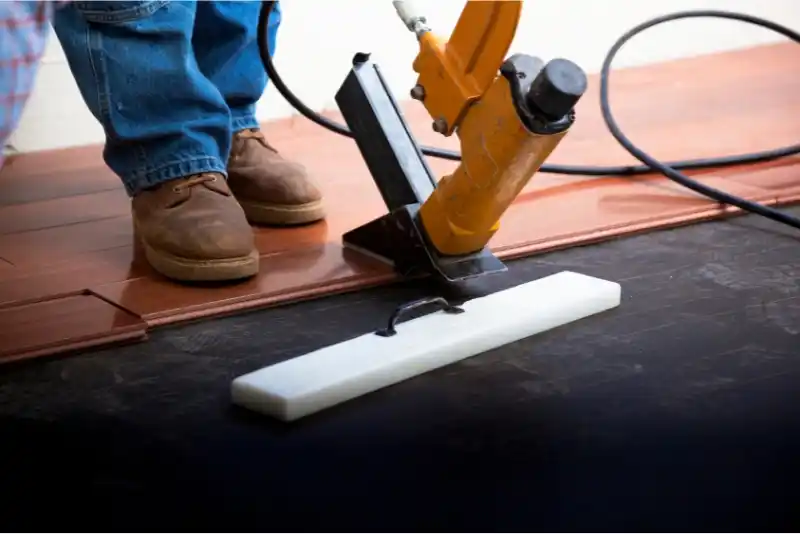
For further insight into the installation procedure of engineered hardwood flooring, peruse our blog, “Engineered Hardwood Flooring Installation Made Easy“
LVP
LVP also has a user-friendly installation process and presents options like the click-lock or loose-lay installation, catering to DIY enthusiasts. You can easily install LVP without professional help.
Which is the best? LVP vs Engineered Hardwood
Both LVP and engineered hardwood offer DIY-friendly options. However, the diverse installation methods available for engineered hardwood make it more versatile for installation in various areas.
Maintenance
Engineered Hardwood Flooring
Engineered hardwood flooring requires regular maintenance to preserve its beauty and durability. It requires routine cleaning and prompt spill cleanup. With the option for occasional refinishing exercised regularly, engineered hardwood flooring will maintain factory appearance for many years.
LVP
LVP excels in low maintenance requirements. Simple cleaning is sufficient to maintain its appearance. Its resistance to stains and scratches reduces the need for refinishing, ensuring long-lasting durability with minimal effort.
Which is the best? LVP vs Engineered Hardwood
Both LVP and engineered hardwood are easy to maintain. However, engineered hardwood’s refinishing option extends its lifespan, making it superior for those who prioritize long-term durability and maintenance flexibility.
Cost Analysis
Initial Cost
- Engineered Hardwood: It may have a higher initial cost due to its premium quality and natural composition. Still, its durability and timeless luxury appeal make it a valuable long-term investment.
- LVP: LVP is known for its affordability. It offers a budget-friendly option with lower upfront costs. While it provides immediate savings, it may not match engineered hardwood’s longevity and aesthetic appeal.
Long-term investment
- Engineered Hardwood: Despite the higher initial cost, engineered hardwood is a wise long-term investment. Its durability and timeless appeal make it a favorite material for interior designers seeking lasting value, which in turn increases the equity and property resale price for homeowners.
- LVP: Although durable, LVP’s long-term investment value may vary, it typically offers reduced longevity and lesser aesthetic appeal than engineered hardwood, potentially requiring replacement over time.
Read our blog for more details on the pricing of engineered hardwood flooring, “How Much Does Engineered Hardwood Flooring Cost?“
Which is the best? LVP vs Engineered Hardwood
In terms of cost, both options are affordable. While LVP is more budget-friendly initially, engineered hardwood offers lasting value and durability. Experienced industry professionals from architects to construction managers to commercial home products retailers alike know that engineered hardwood is the superior choice for those prioritizing long-term investment and quality.
Factors Influencing Your Decision
Lifestyle Considerations
When selecting flooring for your space, consider your lifestyle. Consider factors such as foot traffic from resident adults, children and pets, as well as the frequency of visiting guests. Different flooring options vary in durability and maintenance requirements, so choose one that aligns with your lifestyle demands.
Environment Considerations
Another essential factor to consider when choosing flooring is the room’s environment. Factors like moisture levels, temperature fluctuations and exposure to sunlight can affect the performance and longevity of different flooring materials. Evaluate your space’s specific conditions and choose the flooring option that best suits you.
Design Preferences
Whether you work with a professional interior designer or go the DIY route aided by Pinterest or other digital decor guides, your personal style and design preferences play a significant role in choosing flooring. Consider the overall aesthetic of your home or the specific room where you intend to install the flooring. Whether you prefer a sleek modern look, rustic charm or classic elegance, flooring options match every style and preference.

Budget Constraints
Budget is an important practical consideration. Determine your budget limitations and look for flooring options that fit within your budget. Remember to consider long-term maintenance expenses and potential replacement costs to make an informed decision that aligns with your budget.
Which Flooring Should You Buy? LVP vs Engineered Hardwood
When deciding between LVP and engineered hardwood flooring, consider the benefits of each. Both options have strengths, but engineered hardwood is a reliable choice. Its natural wood look adds warmth and sophistication to any room. Its sturdy construction makes it less likely to warp or shift, especially in areas with varying humidity levels.
Moreover, engineered hardwood offers the advantage of refinishing, allowing you to refresh, redesign and revitalize your floors. While LVP is water-resistant, engineered hardwood can also handle moisture with proper sealing, making it adaptable to different spaces. Whether you choose LVP or engineered hardwood depends on your preferences and lifestyle. However, if longevity and durability are important, engineered hardwood is ideal for your home.
Upgrade Your Space’s Aesthetics By Adding Engineered Hardwood Flooring.
When deciding between LVP and engineered hardwood flooring, homeowners and retailers, along with architects and designers, have demonstrated a strong preference for engineered hardwood flooring. Its authentic wood appearance brings warmth and elegance to any room, and its sturdy construction lasts years. Engineered hardwood also offers the option to refinish, providing enduring beauty and durability.
Villagio Wood Floors is here to help you with our premium selection of engineered hardwood. Based in California, we offer high-quality flooring that meets the needs of homeowners and retailers alike. Upgrade your space with our engineered hardwood flooring, which provides timeless elegance, durability and value. Partner with us to ensure your customers’ homes showcase exceptional quality and remain satisfied for years.
LVP vs Engineered Hardwood Flooring – FAQs
Are LVP and engineered hardwood suitable for all areas of the home?
LVP and engineered hardwood are versatile flooring options for most areas in the home. However, it is important to consider factors like moisture levels and subfloor conditions before deciding.
Do LVP and engineered hardwood have similar warranties?
Warranties may vary between manufacturers. Generally, LVP and engineered hardwood have warranties covering defects in materials and artistry. However, the length and specific terms of the warranties can differ, so reviewing the warranty details for each product is important.
Can engineered hardwood be installed over existing flooring?
You can often install engineered hardwood over existing flooring, including plywood, concrete or hardwood floors. However, it is highly recommended by construction experts to ensure the existing flooring is in good condition and properly prepared before installation to achieve the best results.
Are there specific subfloor requirements for installing LVP or engineered hardwood?
You can install LVP and engineered hardwood over various subfloors, such as plywood, concrete and existing flooring. Proper subfloor preparation ensures a stable and long-lasting installation. Subfloor requirements vary by product and installation method. So, it’s best to follow the manufacturer’s guidelines, and/or consult a certified professional contractor.
Can LVP or engineered hardwood be installed over radiant heating systems?
You can use LVP and engineered hardwood with radiant heating systems. However, ensuring the heating system is compatible with the flooring and installed according to the manufacturer’s recommendations is of critical importance. It is advisable to consult with a or home construction expert to ensure proper installation and prevent damage to the flooring.

